Gather 'round us you Americans,
If you believe in right and wrong.
The newspapers have ignored this;
I'll tell it in a song.
The papers and the TV
Never told the story straight,
So, listen now, I will to you
The honest facts relate.
Let me take you to a corner
Of this world that we call free.
It's Monroe, North Carolina,
Where the Klan rules by decree.
Maybe you thought the Klan was dead
And buried long ago.
Well, in August 1961
You should ha' been in old Monroe.
It's a town of about ten thousand,
And could be a pretty place.
But there's uncertainty and fear
To be seen on many a face.
A railroad slices through Monroe
It's not one town but two towns
On the right, Monroe is white
And on the left is Newtown.
Eighteen Freedom Riders came
In August '61.
At the call of young Rob Williams
To see what could be done.
Robert Williams was a leader,
A giant of a man.
He said, let's protect our families
From the violence of the Klan.
The Klansmen, they got busy;
They came from everywhere,
All armed with guns and pistols,
And Chief Mauney didn't care.
They staged a bloody riot
And the deck was surely stacked,
'Cause the only ones arrested
Were the ones who were attacked.
Hey, listen for the frame-up!
Did the Klan lay a plan?
To trap Williams and his friends
And make him flee the land?
A couple, by name of Stegall
Were driving in a car.
They drove right into Newtown;
That was a bit too far.
For Negroes live in Newtown,
And on that fatal day
They'd set their lines of self-defense
Against the K.K.K.
The Stegalls, they were frightened;
They stopped at Williams' door.
And Robert Williams told the crowd
To let the Stegalls go.
He said, come inside my house.
You'll get hurt if you stay here.
And Williams let the Stegalls
Inside his own house there.
And though this man had saved them,
Police got on his trail.
Nothing less than a kidnap charge:
Twenty years to life in jail.
And then the mighty F.B.I.
Joined in to help the Klan,
With vicious posters tacked up
In post offices through the land.
Saying Rob was armed and dangerous
And schizophrenic, too,
As though to shoot him down on sight
Would be the safest thing to do.
But Rob escaped to Canada,
And then to Mexico.
And now he stays in Cuba
Where the F.B.I. can't go.
And now a make believe trial
Comes in May of ‘62,
And we are wondering if in Monroe
That justice will come through.
Perhaps when it gets to the Supreme Court
They'll get a better shake.
But it's in the hearts of you and me,
The decision must be made.
For we all are just as guilty,
Till we make that day to come
When Robert Williams can return
To his Union County home.
So listen, Mr. President,
And listen Brother Bob:
If you'd defend the Free World,
Here is a little job.
If you don't believe the words I say,
Go see it for yourself.
Go down and visit old Monroe,
But be careful of your health.
There's lots of good people in Monroe,
But they are scared to say.
Go down to old Monroe, Bob.
Tell them: this is the U.S.A.
They say the German people
The crimes of Hitler never knew.
Well, let American people
See what fascists here can do.
For we've had enough of murder,
And we've had enough of lies,
And the Klu Klux Klan in old Monroe
Is due to be surprised.
For in Washington and 'round the world
We're being asked today,
Is Monroe, North Carolina,
In the good old U.S.A.?
Monroe! Monroe!
I hear those voices say:
Is Monroe, North Carolina,
In the good old U.S.A.?
If you believe in right and wrong.
The newspapers have ignored this;
I'll tell it in a song.
The papers and the TV
Never told the story straight,
So, listen now, I will to you
The honest facts relate.
Let me take you to a corner
Of this world that we call free.
It's Monroe, North Carolina,
Where the Klan rules by decree.
Maybe you thought the Klan was dead
And buried long ago.
Well, in August 1961
You should ha' been in old Monroe.
It's a town of about ten thousand,
And could be a pretty place.
But there's uncertainty and fear
To be seen on many a face.
A railroad slices through Monroe
It's not one town but two towns
On the right, Monroe is white
And on the left is Newtown.
Eighteen Freedom Riders came
In August '61.
At the call of young Rob Williams
To see what could be done.
Robert Williams was a leader,
A giant of a man.
He said, let's protect our families
From the violence of the Klan.
The Klansmen, they got busy;
They came from everywhere,
All armed with guns and pistols,
And Chief Mauney didn't care.
They staged a bloody riot
And the deck was surely stacked,
'Cause the only ones arrested
Were the ones who were attacked.
Hey, listen for the frame-up!
Did the Klan lay a plan?
To trap Williams and his friends
And make him flee the land?
A couple, by name of Stegall
Were driving in a car.
They drove right into Newtown;
That was a bit too far.
For Negroes live in Newtown,
And on that fatal day
They'd set their lines of self-defense
Against the K.K.K.
The Stegalls, they were frightened;
They stopped at Williams' door.
And Robert Williams told the crowd
To let the Stegalls go.
He said, come inside my house.
You'll get hurt if you stay here.
And Williams let the Stegalls
Inside his own house there.
And though this man had saved them,
Police got on his trail.
Nothing less than a kidnap charge:
Twenty years to life in jail.
And then the mighty F.B.I.
Joined in to help the Klan,
With vicious posters tacked up
In post offices through the land.
Saying Rob was armed and dangerous
And schizophrenic, too,
As though to shoot him down on sight
Would be the safest thing to do.
But Rob escaped to Canada,
And then to Mexico.
And now he stays in Cuba
Where the F.B.I. can't go.
And now a make believe trial
Comes in May of ‘62,
And we are wondering if in Monroe
That justice will come through.
Perhaps when it gets to the Supreme Court
They'll get a better shake.
But it's in the hearts of you and me,
The decision must be made.
For we all are just as guilty,
Till we make that day to come
When Robert Williams can return
To his Union County home.
So listen, Mr. President,
And listen Brother Bob:
If you'd defend the Free World,
Here is a little job.
If you don't believe the words I say,
Go see it for yourself.
Go down and visit old Monroe,
But be careful of your health.
There's lots of good people in Monroe,
But they are scared to say.
Go down to old Monroe, Bob.
Tell them: this is the U.S.A.
They say the German people
The crimes of Hitler never knew.
Well, let American people
See what fascists here can do.
For we've had enough of murder,
And we've had enough of lies,
And the Klu Klux Klan in old Monroe
Is due to be surprised.
For in Washington and 'round the world
We're being asked today,
Is Monroe, North Carolina,
In the good old U.S.A.?
Monroe! Monroe!
I hear those voices say:
Is Monroe, North Carolina,
In the good old U.S.A.?
inviata da Alessandro - 12/6/2009 - 12:13
×
![]()

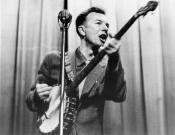
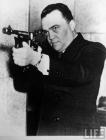
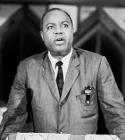
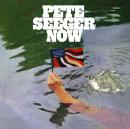
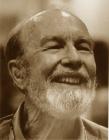


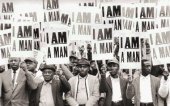
Testo di Malvina Reynolds e di Pete Seeger, che scrisse la maggior parte delle strofe.
La melodia è quella di “Poor Ellen Smith”, ballata popolare risalente all’800.
Testo trovato su Broadside Magazine n.5 del maggio 1962.
Questa canzone è parecchio lunga, anche perché incredibile è la storia che racconta.
Monroe, North Carolina, 1958. Fuzzy Simpson e Hanover Thompson, due bambini di colore rispettivamente di sette e nove anni stanno giocando con una bambina bianca, loro coetanea. Il gioco è quello del “bacio” (sarà stato tipo ”naso in su, naso in giù, dai un bacio a chi vuoi tu” o qualcosa del genere…). La bimba dà un bacetto sulla guancia ad Hanover e poi, birbantella, corre a dirlo alla madre…. I due bambini furono arrestati dallo sceriffo locale, processati per tentato stupro e violazione delle leggi segregazioniste e condannati a stare in riformatorio fino ai 21 anni di età.
L’episodio era talmente assurdo e terribile, anche in un luogo dove il KKK dettava legge, che la comunità nera insorse. Il più risoluto di tutti fu il trentatreenne Robert F. Williams, responsabile della locale sezione della “National Association for the Advancement of Colored People” (NAACP), che diede battaglia legale contro la sentenza e riuscì ad attirare l’attenzione dei media e dell’opinione pubblica sulla vicenda. I bambini furono rilasciati dopo tre mesi di detenzione, ma i razzisti, il KKK e la polizia giurarono vendetta…
Gli attacchi contro la comunità nera di Monroe si moltiplicarono e, in tutta risposta, Williams organizzò delle pattuglie di autodifesa armate. L’iniziativa non piacque ai vertici della NAACP e a Martin Luther King, che per sei mesi sospese Williams dal suo incarico nell’associazione. Ma Williams, che godeva di molta stima tra i suoi, riuscì ad impedire lo scontro armato, i cui esiti avrebbero potuto essere disastrosi, tra la comunità nera e quella bianca. Di fatto la “Black Armed Guard” organizzata da Williams a Monroe ebbe successo e, storicamente, costituì anche un precedente e un riferimento per il futuro movimento delle Black Panthers.
Nel 1961 Williams organizzò l’accoglienza a Monroe dei Freedom Riders, gli attivisti antirazzisti che percorrevano gli Stati del sud per sostenere i diritti civili e, in particolare, il diritto di voto degli afroamericani. Proprio durante la campagna organizzata dal Congress of Racial Equality, i razzisti misero in atto la loro vendetta contro Williams… Una coppia di coniugi membri del KKK si mise a provocare alcuni attivisti ma fu circondata da una folla di neri giustamente incazzati… Williams intervenne e salvò il culo alle due testedicazzo ospitandoli nella propria casa, ma fu costretto a trattenerli fino a notte fonda perché gli “incazzati neri” non davano segno di essersi calmati. Così Williams fu incriminato per sequestro di persona. Edgar J. Hoover in persona si preoccupò di diffondere il “Wanted”. Ma Williams non si fece catturare e riuscì a rifugiarsi prima a Cuba e poi in Cina, dove divenne giornalista e scrittore (il suo “Negroes With Guns” influenzò parecchio le Black Panthers…) Al suo rientro negli USA, nel 1969, fu comunque processato, anche se da uomo libero, e nel 1976 fu finalmente assolto da ogni imputazione a suo carico.
Williams ha lavorato poi presso il Centro Studi sulla Cina dell’Università del Michigan.
E’ morto nel 1996.